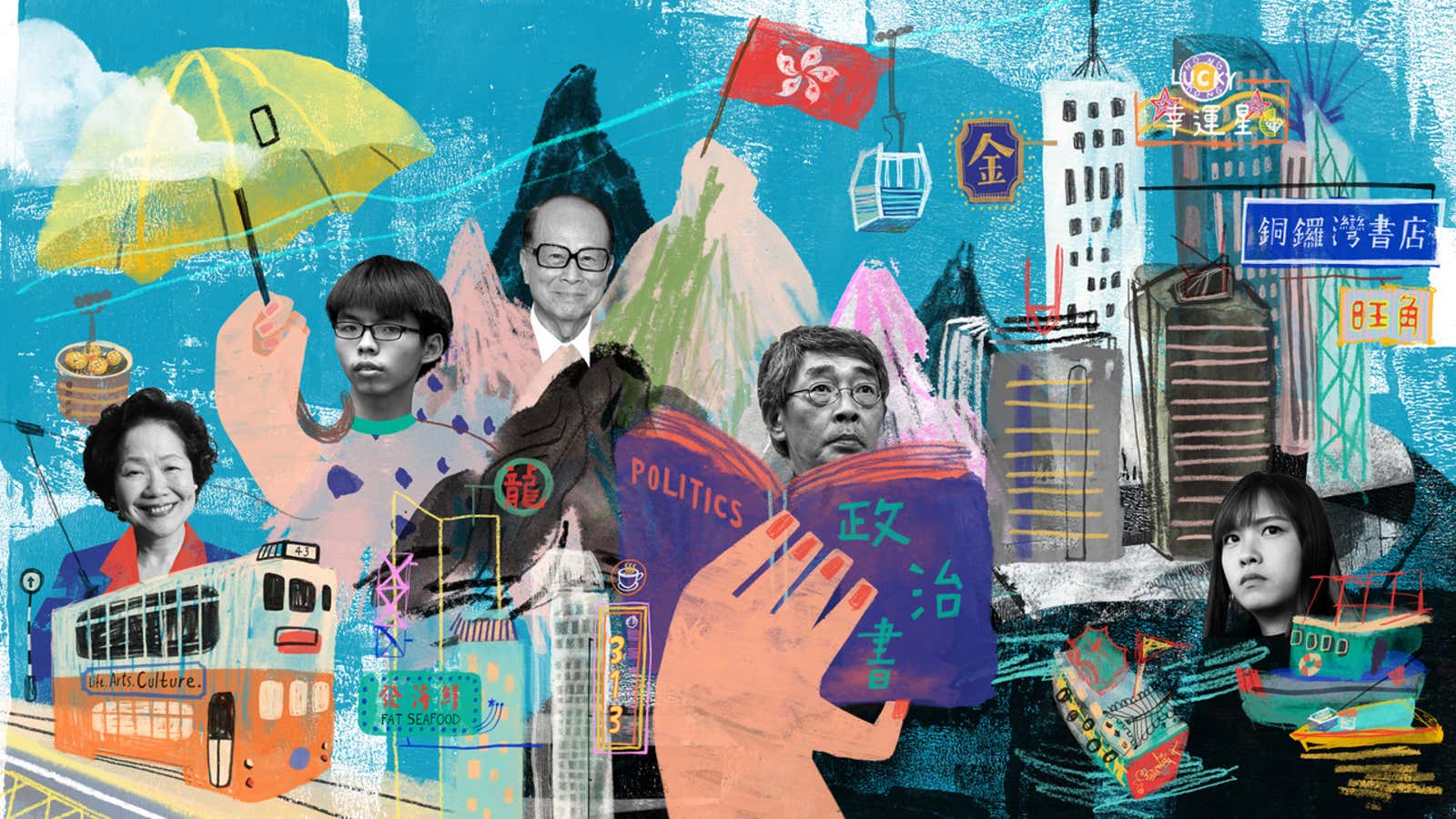Just past midnight on July 1, 1997, Chris Patten, the last governor of the Crown Colony, sipped a glass of red wine as he sailed away from Victoria Harbor on a royal yacht in driving rain. About an hour later, Tung Chee-hwa, a former shipping magnate, took his oath of office before Chinese premier Li Peng and became the first chief executive of the new Hong Kong Special Administration Region. The British flag came down and China’s flag and a new Hong Kong flag were hoisted. Far away on the mainland, fireworks exploded over Tiananmen Square.
And with that, China resumed control of Hong Kong, ending more than 150 years of British colonial rule. Under the “One Country, Two Systems” formula, which Chinese president Jiang Zemin promised in his handover speech would be implemented “unswervingly,” Hong Kong was to retain its capitalist financial market, freedom of expression, and partial democracy—for at least 50 years. For many in Hong Kong, the two decades of that bold experiment appears to be a creeping process of “one country” overriding “two systems” everywhere from politics and human rights, to the economy and language.
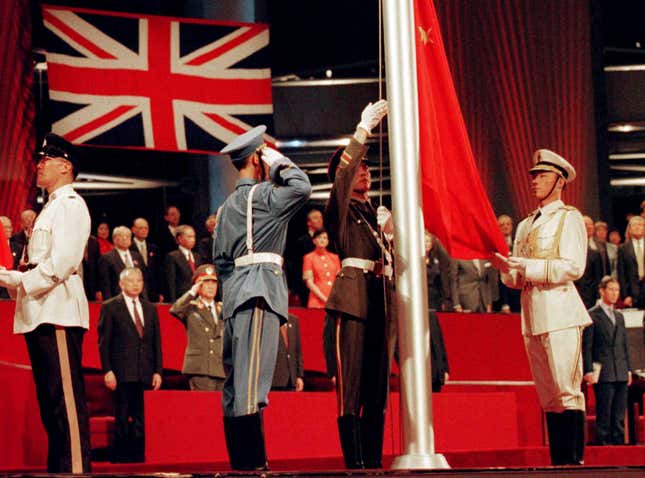
When it comes to Hong Kong’s economy, Chinese companies are now beginning to crowd out local and foreign firms in industries like banking and real estate. Dissidents who openly rally for democracy—or make material taboo in China available—have increasingly been retaliated against. Many have long derided the city government as the tool of Beijing and now also fear Hong Kong’s independent judicial system is at risk. The biggest disappointment so far has been the failure to open up voting for the chief executive, leading to mass protests in 2014.
Here’s a look back at the highs and lows Hong Kong has experienced over the two decades since the handover, told through the people and moments who more often than not reflect the tensions of an increasingly complicated Hong Kong-China relationship.
1998
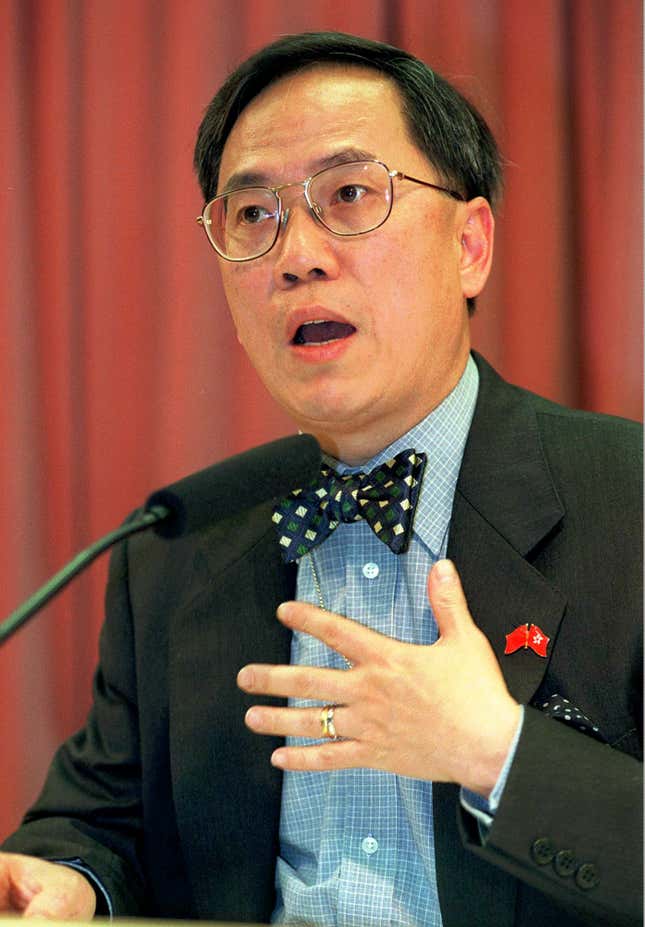
Billionaire George Soros successfully bet against the currencies of Thailand and Malaysia during the 1997 Asian financial crisis, but was forced to walk away from Hong Kong with losses the next year. That was largely thanks to the dapper then-financial secretary Donald Tsang, who went on a HK$118 billion ($15 billion) stock-buying spree to defend the Hong Kong dollar’s peg against the US dollar.
In 2005, when Tung, the first chief executive of the SAR resigned after losing the confidence of both Hong Kong people and the central government, Tsang became the city’s No. 1 official. Earlier this year, the 72-year-old Tsang was sentenced to 20 months in jail on a corruption offense that occurred just before his retirement in 2012.
1999
Property tycoon Li Ka-shing was ranked by Forbes as Hong Kong’s richest person for the first time in 1999 (link in Chinese), and has since retained the top spot for 19 straight years (he’s also among the world’s richest, usually somewhere around the top 20).
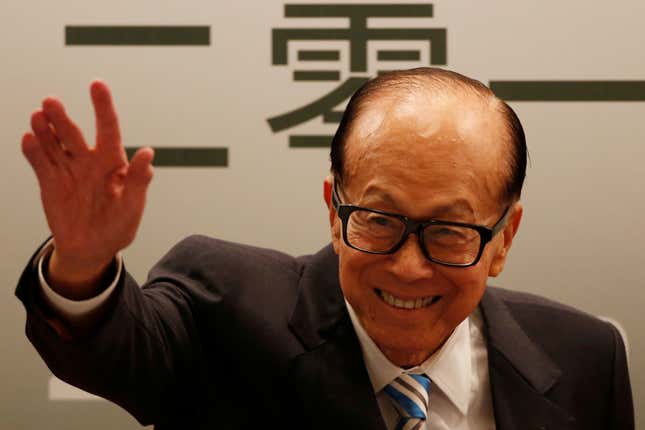
Li’s family fled China for Hong Kong during the Sino-Japanese war, and his father died soon after. In 1950, he established a factory to make plastic flowers and then began to invest in real estate. His flagship company, Cheung Kong Property Holdings, is currently the world’s third-largest property developer by market value. Nicknamed “Superman” for his business prowess, the nearly 89-year-old recently denied reports that he’ll retire as chairman from his global conglomerate, CK Hutchison Holdings, by next year.
Despite his rags-to-riches story, Li is also seen as a symbol of the hold a handful of companies have on Hong Kong’s economy, in everything from phone and internet service to real estate. Competition from Chinese developers hasn’t helped, though, instead driving up prices in the world’s most unaffordable housing market.
2000
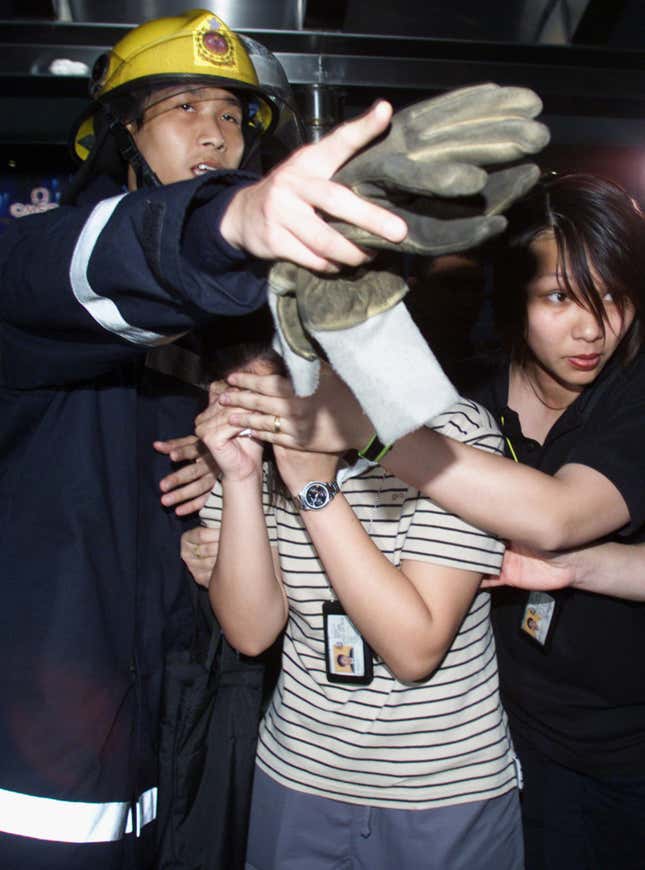
On August 2, 2000, a group of mainland Chinese who sought the right to permanently stay in Hong Kong started a fire at Immigration Tower, leading to the deaths of a senior official and one of their group. Leading protester Shi Junlong was sentenced to eight years in prison (link in Chinese) for manslaughter.
Shi was extradited to China after completing his sentence. But he became a Hong Kong resident in 2011 under the “one-way permit” scheme that allows mainlanders to reunite with their families in Hong Kong. Created in the 1980s, the special program is administered by mainland authorities, and Hong Kong has no say in whom it takes.
2001
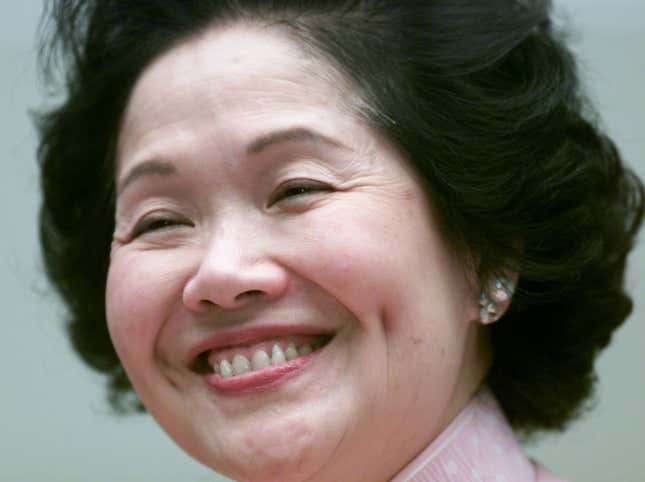
Anson Chan served as Hong Kong’s chief secretary for nearly a decade under both British and Chinese rule. In 1962, Chan was one of just two women to enter the civil service. Three decades later, Chan became the first woman and ethnic Chinese person to hold the second-highest government position in Hong Kong.
Chan voiced greater support for democracy and free speech than her Beijing-backed boss, Tung—when she resigned in 2001, many in Hong Kong thought it was due to these differences. Her stance earned her the nicknames “Hong Kong’s conscience” and “Iron Butterfly.”
2002
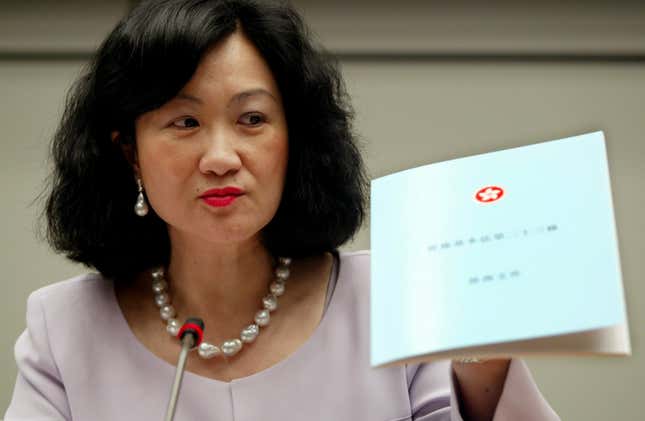
In September 2002, the Hong Kong government introduced its first proposal under Article 23 of the Basic Law, which authorizes the local administration to pass laws covering treason and sedition. Regina Ip, then-security secretary, was perhaps the most vocal supporter of the security bill. After the proposal was withdrawn the following year amid massive public protests over fears that human rights and freedom of assembly would be hit, Ip resigned from her post, citing “personal reasons.”
In 2012 and 2017, Ip ran for the chief executive elections, but didn’t get enough votes to enter the races. During her 2017 campaign, she pledged to enact Article 23 in “suitable measures” if elected.
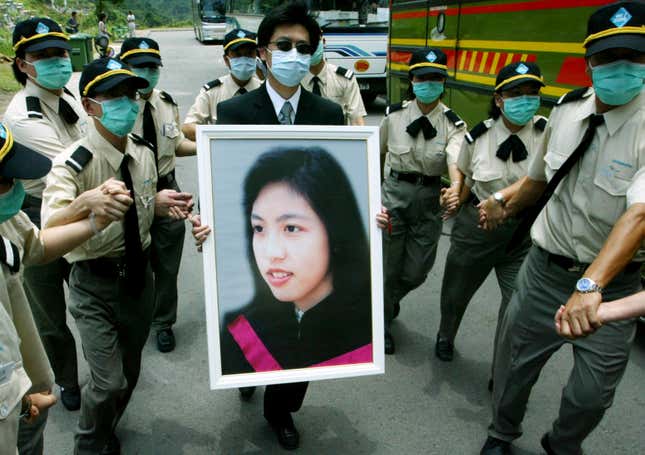
2003
This was a mournful year for Hong Kong: the outbreak of SARS, or Severe Acute Respiratory Syndrome, took 299 lives in the city and sowed widespread panic.
Tse Yuen-Man was the first public hospital doctor to die from SARS. The 35-year-old woman, who volunteered to work with SARS patients at Tuen Mun hospital, was infected with the virus when she tried to resuscitate a patient.
In 2003, Hong Kong also lost two Cantopop legends, Leslie Cheung and Anita Mui. Cheung, suffering from depression, jumped to his death from the Mandarin Oriental hotel in Central on April Fools’ Day, while Mui died at the end of the year after a battle with cervical cancer.
2004
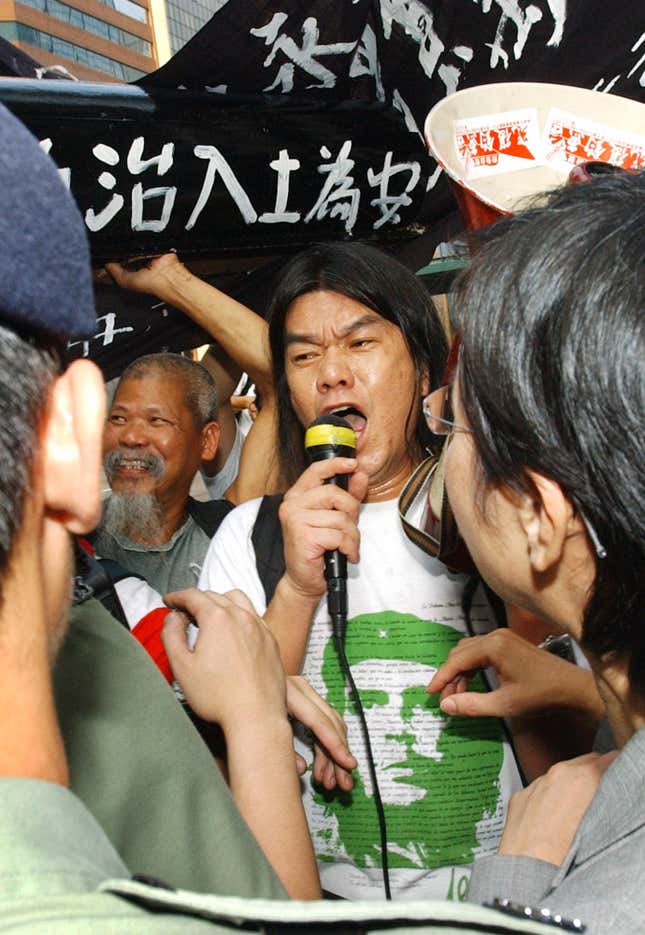
Leung Kwok-hung, nicknamed “Long Hair” for his mane, is a longtime democracy activist in Hong Kong. In 2004, Leung was elected to the Legislative Council for the first time, and still sits in the legislature today.
Leung, who models himself on Argentine revolutionary Che Guevara, never shies away from confronting the central and Hong Kong governments. He has been jailed numerous times for holding public protests. Security guards have at times dragged him away for disrupting top officials’ speeches. Beijing has more than once banned him from entering the mainland.
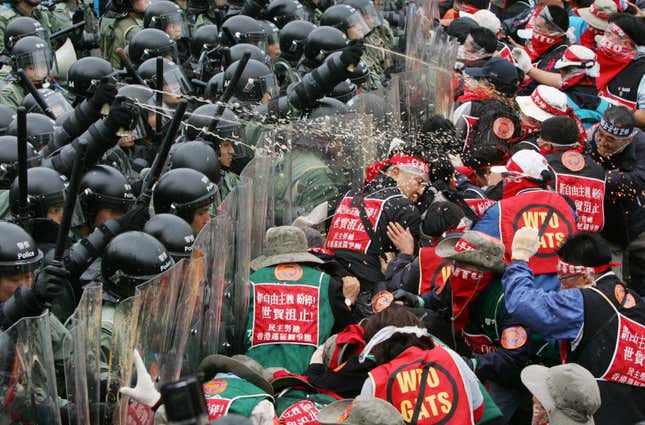
2005
Thousands of anti-globalization activists from across the globe flooded Hong Kong in December 2005 to protest against the World Trade Organization summit. One category of protester stood out: the South Korean farmer, fiercely opposed to efforts to open the country’s agricultural market. (About as many police mobilized to thwart anti-globalization protesters then as to secure the city this week for president Xi Jinping’s visit.)
Farmer protests escalated into the fiercest fighting to happen in the city for decades. On Dec. 17, police used water cannons, tear gas, and pepper spray to disperse farmers who tried to breach police cordons.
2006
![Hong Kong's Bishop Joseph Zen Ze-kiun attends a ceremony to be elevated to cardinal by [Pope Benedict XVI] at the Vatican March 24, 2006. Pope Benedict installs his first group of new cardinals on Friday, elevating a familiar face and some surprising choices to the exclusive Roman Catholic club that advises him and will one day elect his successor.](https://i.kinja-img.com/image/upload/c_fit,q_60,w_645/6b2d5329012b93d4f83b4fdb14d579b4.jpg)
Joseph Zen, an outspoken critic of Beijing, was a bishop of Hong Kong for over six years. In February 2006, Zen was selected by Pope Benedict as one of his 15 new cardinals. China, which installs its own bishops without the Vatican’s approval, later denounced the promotion as a “hostile act.”
In 2016 Zen warned against allowing the Communist government to have a hand in selecting bishops, as the Vatican and Beijing was reportedly in talks of a deal. “[T]he diplomats in the Vatican… are typical diplomats. They just want to achieve something, to succeed, have agreements with governments at all costs,” Zen told Quartz. “But I do not see any reason to be optimistic about the Church in China.”
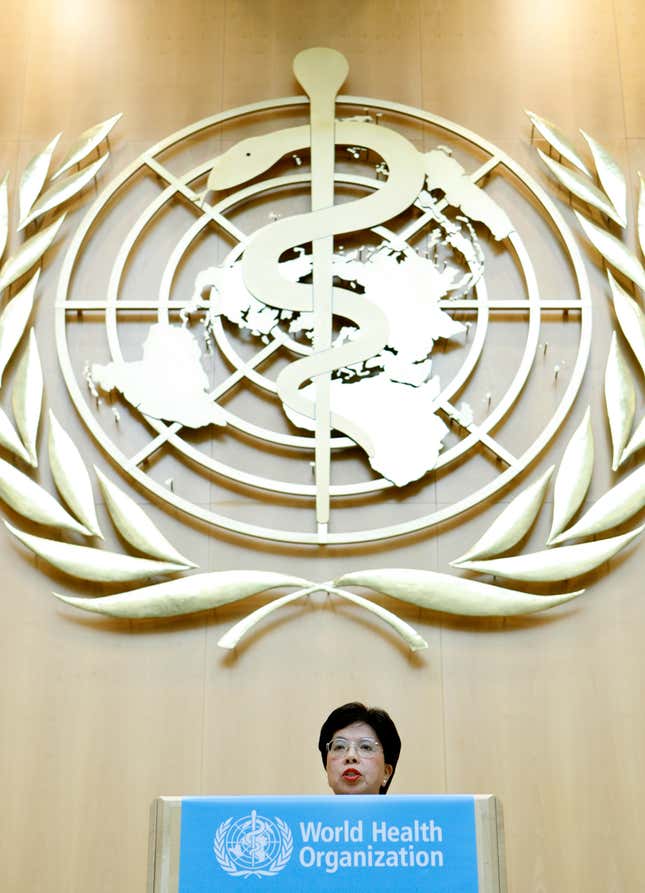
2007
In January 2007, Margaret Chan, Hong Kong’s former health director, began her decade of work as the World Health Organization’s (WHO) director-general. An expert on SARS and bird flu, Chan became the first Chinese person to lead a United Nation agency, after being elected in late 2006. Chan was later heavily criticized for the WHO’s slow response to the Ebola outbreak in West Africa.
The year also marked the last hurrah for Hong Kong investors before the global financial crisis that began in 2008 took its toll: the benchmark Hang Seng Index hit its all-time high of 31,638 points in October. The year saw the city’s bankers and hedge fund titans organize boxing matches—Hedge Fund Fight Night—at five-star hotels. For charity, of course.
2008
![Skip to main contentSkip to toolbar Dashboard Dashboard Home Comments I’ve Made Site Stats My Blogs Blogs I Follow Calendar Story Budget Omnisearch VIP VIP VIP Resources Posts Posts All Posts Add New Copy a Post Media Media Library Add New Items Items Items Add New Stacks Stacks All Stacks Add New Feedback Feedback Polls Ratings Feedback Profile Profile My Profile Personal Settings Tools Tools Available Tools Ad Generator Settings Settings Flash Briefing Sharing Polls Chartbeat Quartz Profile My Site Reader Stats Log Out Help Screen Options Edit Post Publishing Checklist Post title is required Social description is required SEO Title (for search engine result pages) is required Tags are required A single topic is required A featured image or social image is required Saved status must be Ready to Publish, if not already published or scheduled. Enter title here The faces of Hong Kong: A timeline of the 20 years since the handover Permalink: https://qz.com/1011155/the-faces-of-hon…nce-the-handover/ Edit View API Get Shortlink Add Media Add Embed Add LocationVisualText Paragraph p » span Word count: 2554 Draft saved at 9:04:21 pm. Last edited by Tripti Lahiri on June 28, 2017 at 8:32 pm Toggle panel: Publish Publish Save Preview (opens in a new window) Status: Pending edit Edit Edit status Visibility: Public Edit Edit visibility Revisions: 35 Browse Browse revisions Publish immediately Edit Edit date and time Publicize: Not Connected Show Move to TrashPublish Toggle panel: Tags Tags Add New Tag Add Separate tags with commas Remove term: 2010 hong kong by-election 2010 hong kong by-electionRemove term: anita mui anita muiRemove term: Anson Chan Anson ChanRemove term: article 23 article 23Remove term: Asia AsiaRemove term: Beijing BeijingRemove term: cardinal Joseph Zen cardinal Joseph ZenRemove term: carrie lam carrie lamRemove term: causeway bay books causeway bay booksRemove term: charles kao charles kaoRemove term: chris pattern chris patternRemove term: Donald Tsang Donald TsangRemove term: Edward snowden hong kong refugees Edward snowden hong kong refugeesRemove term: Hong Kong Hong KongRemove term: hong kong booksellers hong kong booksellersRemove term: Hong Kong handover Hong Kong handoverRemove term: joshua wong joshua wongRemove term: lam wing-kee lam wing-keeRemove term: leslie cheung leslie cheungRemove term: Leung Chun-hang Leung Chun-hangRemove term: Leung Kwok-hung Leung Kwok-hungRemove term: Li Ka-shing Li Ka-shingRemove term: Li Peng Li PengRemove term: long hair long hairRemove term: regina ip regina ipRemove term: SARS hong kong 2003 SARS hong kong 2003Remove term: Shi Junlong Shi JunlongRemove term: south korean WTO protests in Hong Kong south korean WTO protests in Hong KongRemove term: Szeto Wah Szeto WahRemove term: Tse Yuen-man Tse Yuen-manRemove term: tung chee-hwa tung chee-hwaRemove term: umbrella movement umbrella movementRemove term: victoria park annual vigil victoria park annual vigilRemove term: Xi Jinping Xi JinpingRemove term: Yau Wai-ching Yau Wai-ching Choose from the most used tags Toggle panel: Topics Topics All Topics Most Used Politics and Policy Science and Tech Lifestyle Other Topics Health and Human Behavior Economics Finance Work and Management The Global Consumer + Add New Topic Toggle panel: Obsessions Obsessions Current Obsessions Other [None] "America First" Africa Innovators China in Africa China's Transition Design Energy Shocks Fashion Future of Finance Future of Work Glass Language Life as Laboratory Machines with Brains Messaging Modi's Moment Propaganda Science of Learning Space Business The Art of Parenting The Office Toggle panel: Ad Options Ad Options Suppress All Ads Select Yes to prevent ALL advertising from being displayed on this post. No Yes Suppress Engage Ads Select Yes to prevent engage advertising from being displayed before or after this post. No Yes Suppress Inline Ads Select Yes to prevent inline advertising from being displayed in this post. No Yes Suppress Marquee Ads Select Yes to prevent marquee advertising from being displayed before this post. No Yes Toggle panel: Post Subtype Post Subtype Post Subtype Toggle panel: Featured Image Size Featured Image Size Featured Image Size Toggle panel: Editorial Metadata Editorial Metadata First Draft Date When the first draft needs to be ready. Assignment What the post needs to cover. Needs PhotoChecked if this post needs a photo. Word Count Required post length in words. Toggle panel: Featured Image Featured Image Click the image to edit or update Remove featured image Toggle panel: Social Image Social Image Set Social Image Toggle panel: Featured Video Poster Featured Video Poster Set Featured Video Poster Toggle panel: Featured Video Filmstrip Featured Video Filmstrip Set Featured Video Filmstrip Toggle panel: Apple News Apple News Toggle panel: Series Series Toggle panel: Edition Edition Toggle panel: Kicker Kicker LOOKING BACK Toggle panel: Writing Helper Writing Helper Copy a Post Copy a Post Use an existing post as a template. Request Feedback Request Feedback Get feedback on this draft before publishing. Toggle panel: SEO SEO Title The Hong Kong handover: A timeline, in faces, of the past 20 years The title that appears on search engine results pages. Toggle panel: Facebook Preview Facebook Preview Quartz Just now The faces of 20 years: A timeline of Hong Kong since the handover A look at the highs and lows Hong Kong has experienced over the past two decades. QZ.COM Quartz Just now The faces of 20 years: A timeline of Hong Kong since the handover qz.com Toggle panel: Miscellaneous Options Miscellaneous Options Toggle panel: Byline Fields Byline Fields Byline Type Select from the list Toggle panel: Social Options Social Options Toggle panel: Ticker Symbols Ticker Symbols Search for a ticker symbol or company name (Or insert a symbol.) within Search Ticker symbols for this post: Toggle panel: Editorial Comments Editorial Comments Respond to this post Toggle panel: Footnotes Footnotes Footnote 1 Add Footnote Toggle panel: Revisions Revisions Tripti Lahiri, 3 mins ago (June 28, 2017 @ 20:32:37) Tripti Lahiri, 18 mins ago (June 28, 2017 @ 20:17:20) Tripti Lahiri, 56 mins ago (June 28, 2017 @ 19:39:48) Tripti Lahiri, 14 hours ago (June 28, 2017 @ 06:12:02) Tripti Lahiri, 14 hours ago (June 28, 2017 @ 06:09:23) Tripti Lahiri, 14 hours ago (June 28, 2017 @ 06:06:26) Tripti Lahiri, 16 hours ago (June 28, 2017 @ 04:39:58) Tripti Lahiri, 17 hours ago (June 28, 2017 @ 03:33:37) Zheping Huang, 2 days ago (June 27, 2017 @ 01:14:11) Zheping Huang, 2 days ago (June 27, 2017 @ 01:13:05) [Autosave] Zheping Huang, 2 days ago (June 27, 2017 @ 01:10:48) Zheping Huang, 2 days ago (June 27, 2017 @ 01:05:45) Zheping Huang, 2 days ago (June 27, 2017 @ 01:01:46) Zheping Huang, 2 days ago (June 27, 2017 @ 00:59:46) Zheping Huang, 2 days ago (June 27, 2017 @ 00:53:10) Zheping Huang, 2 days ago (June 27, 2017 @ 00:51:23) Zheping Huang, 2 days ago (June 27, 2017 @ 00:50:33) Zheping Huang, 2 days ago (June 27, 2017 @ 00:41:34) Zheping Huang, 2 days ago (June 27, 2017 @ 00:41:08) Zheping Huang, 2 days ago (June 27, 2017 @ 00:39:28) Zheping Huang, 2 days ago (June 27, 2017 @ 00:37:17) Zheping Huang, 2 days ago (June 26, 2017 @ 23:47:51) Zheping Huang, 2 days ago (June 26, 2017 @ 23:46:05) Zheping Huang, 2 days ago (June 26, 2017 @ 23:04:05) Alice Truong, 2 days ago (June 26, 2017 @ 21:48:38) Alice Truong, 2 days ago (June 26, 2017 @ 21:48:08) [Autosave] Tripti Lahiri, 2 days ago (June 26, 2017 @ 21:28:09) Zheping Huang, 6 days ago (June 22, 2017 @ 20:34:55) Zheping Huang, 7 days ago (June 21, 2017 @ 21:20:36) Zheping Huang, 7 days ago (June 21, 2017 @ 21:19:11) Zheping Huang, 7 days ago (June 21, 2017 @ 21:17:45) Zheping Huang, 1 week ago (June 21, 2017 @ 11:24:46) Zheping Huang, 1 week ago (June 21, 2017 @ 11:06:06) Zheping Huang, 1 week ago (June 21, 2017 @ 05:25:44) Zheping Huang, 1 week ago (June 21, 2017 @ 05:18:18) Toggle panel: Notifications Notifications Select the users and user groups that should receive notifications when the status of this post is updated or when an editorial comment is added. Users AllSelected Search... Aamna Mohdin aamna@qz.com abairdqz abaird@qz.com Abdi Latif Dahir adahir@qz.com abilyiqz alexb@qz.com abrownqz abrown@qz.com aclarkeqz ac@qz.com acoelhoqz analivia@qz.com Adam Epstein aepstein@qz.com Adam Freelander af@qz.com Adam Pasick adam@qz.com adamfelder afelder@atlanticmedia.com afishmanqz amanda@qz.com ageartyqz agearty@qz.com ahaitalisqz ah@qz.com Aimee Groth aimee@qz.com Akshat Rathi akshat@qz.com alexaqz alexa@qz.com Alice Truong at@qz.com Alison Griswold ali@qz.com Aliza Goldberg aliza@qz.com Allison Benson abenson@qz.com Allison Schrager as@qz.com Amy X. Wang amy@qz.com Ana Campoy acampoy@qz.com Ananya Bhattacharya ananya@qz.com Annalisa Merelli amerelli@qz.com Anne Quito a@qz.com April Siese april@qz.com Arielle Ray aray@qz.com Ashley Rodriguez arodriguez@qz.com Audrey McDermott audrey@qz.com Caitlin Hu chu@qz.com Cassie Werber cassie@qz.com cchappelqz chris@qz.com ccqz cc@qz.com Chase Purdy chase@qz.com Chi-An Wang chian@qz.com choughqz cameron@qz.com Chris Z chris@zarate.org Christopher Groskopf c@qz.com Commentary qzcommentary@gmail.com Corinne Purtill corinne@qz.com Dan Kopf dkopf@qz.com Dave Edwards de@qz.com Dave Gershgorn dave@qz.com Dave Pell dave@davenetics.com David Yanofsky y@qz.com ddodsonqz ddodson@qz.com Devjyot Ghoshal dghoshal@qz.com Diksha Madhok dmadhok@qz.com Echo Huang echo@qz.com Elan Kiderman elan@qz.com Elijah Wolfson elijah@qz.com Elisabeth Ponsot bp@qz.com eliseqz elise@qz.com Elizabeth Winkler ewinkler@qz.com Emily Withrow ewithrow@qz.com emilydiamond74 emily@qz.com Ephrat Livni ephrat@qz.com eralloqz erica@qz.com Erik Olsen erik@qz.com Eshe Nelson eshe@qz.com Eva Scazzero escazzero@qz.com eyuraqz liz@qz.com Felicitas Sanchez feli@qz.com freelanceqz pitches@qz.com gbaconqz grace@qz.com Georgia Frances King gfk@qz.com Gideon Lichfield g@qz.com Gwynn Guilford gguilford@qz.com Hanna Kozlowska hanna@qz.com Hannah Yi hy@qz.com Harish C Menon harish@qz.com hchanqz hchan@qz.com Heather Landy hlandy@qz.com Heather Timmons ht@qz.com Helen Edwards he@qz.com Helena Bala helena.dea.bala@gmail.com hleeqz hal@qz.com Ilaria Maria Sala ilariamariasala@gmail.com imcdonaldqz imcdonald@qz.com Indrani Sen isen@qz.com Isabella Steger is@qz.com Ismat Sarah Mangla ismat@qz.com Itika Sharma Punit isharma@qz.com Jackie Bischof jb@qz.com Jacob Templin jacob@qz.com Jake Flanagin jake@qz.com Jamie Leventhal jleventhal@qz.com Janet Guyon janet@qz.com Jasmin James jjames@qz.com Jason Karaian jason@qz.com Jean-Luc Bouchard jbouchard@qz.com Jenni Avins jenni@qz.com Jennifer Brown jenniferb@qz.com Jennifer Chang jchang@qz.com Jenny Anderson jwa@qz.com Jessanne Collins jcollins@qz.com jgriffin930 jeffrey@qz.com jihoonqz jihoon@qz.com Jill Petzinger jill@qz.com jocelynqz jocelyn@qz.com John Detrixhe jd@qz.com John Keefe jkeefe@qz.com John Mancini jmancini@qz.com John West jwest@qz.com Johnny Simon js@qz.com Joon Ian Wong joon@qz.com Josh Horwitz josh@qz.com joshuanyoung joshyoung@qz.com Julia Case-Levine jcase-levine@qz.com Kabir Chibber kchibber@qz.com Kate Groetzinger kgroetzinger@qz.com Katherine Ellen Foley kfoley@qz.com kdespagniqz kdespagni@qz.com Keith Collins kc@qz.com Kelsey Kennedy kelsey@qz.com kentywang kenty@qz.com Kevin J. Delaney kevin.delaney@gmail.com kevinkim kk@qz.com Khe Hy khy@qz.com Kira Bindrim kira@qz.com kleongqz kiley@qz.com Kristin Oakley ko@qz.com ktranqz ktran@qz.com Lauren Alix Brown laurenalixbrown@gmail.com Leah Fessler lfessler@qz.com leeqz daniel@qz.com Leslie Josephs leslie@qz.com Leslie Nguyen lnguyen@qz.com Lila MacLellan lila@qz.com Lily Kuo m.lilkuo@gmail.com LinYee Yuan linyeeyuan@qz.com lnguyenqzbusiness lnguyen+business@qz.com Lola Fadulu lola@qz.com lrossqz lross@qz.com lshulmanqz larissa@qz.com Luiz Romero luiz@qz.com lupos jchagan80@hotmail.com Lynsey Chutel lynsey@qz.com Madhura Karnik mkarnik@qz.com Manu Balachandran manu@qz.com Marc Bain marc@qz.com Maria Sanchez Diez maria@qz.com Maria Thomas mariat@qz.com Matt Gibbons mgibbons@qz.com Matt Quinn q@qz.com mauraqz maura@qz.com Max de Haldevang mdh@qz.com Max Toomey mt@qz.com mchamberlainqz mchamberlain@qz.com McKinley Noble mnoble@qz.com mia mm@qz.com micahwave micahwave@gmail.com Michael J. Coren mjc@qz.com Michael Tabb tabb@qz.com Mike Murphy mmurphy@qz.com Mimi Onuoha mimi.onuoha@gmail.com mobrienqz mobrien@qz.com Molly Rubin molly@qz.com mportnoyqz mportnoy@qz.com mwrightqz mw@qz.com Nicole Kwok nicolekwoktw@gmail.com Nikhil Sonnad n@qz.com Nupur Anand nupur@qz.com Nushmia Khan khan@qz.com Oliver Staley oliver@qz.com Olivia Goldhill o@qz.com Paul Smalera p@qz.com pleeqz plee@qz.com Quartz qzdotcom@gmail.com Quora publishers@quora.com Roya Wolverson roya@qz.com Sam Rigby sdrigby@qz.com Sam Williams sam@qz.com samanthaqz samantha@qz.com Sangeeta Singh-Kurtz sangeeta@qz.com Sarah Kessler skessler@qz.com Sarah Slobin ss@qz.com Sarah Todd sarah@qz.com Sari Zeidler sari@qz.com Sasha Zients sasha@qz.com sborowskiqz summer@qz.com sdqz sd@qz.com seungyunqz seungyun@qz.com Sibusiso Tshabalala stshabalala@qz.com silviabic silvia.favasuli@linkiesta.it Siyi Chen siyi@qz.com skistnerqz skistner@qz.com sliuqz shirley@qz.com snieminenqz soren@qz.com Solana Pyne solana@qz.com sonainbk sona@qz.com Soo Kyung Jung u3524221@connect.hku.hk sparkqz spark@qz.com ssterlingqz ssterling@qz.com Steve Mollman steve@qz.com Suneera Tandon standon@qz.com Sushma U N sushma@qz.com Svati Kirsten Narula svati@qz.com Therese Reyes theresereyes91@gmail.com Thomas Page McBee thomas@qz.com thowardqz tessa@qz.com Thu-Huong Ha tha@qz.com Tim Fernholz timatquartz@gmail.com Tinashe Mushakavanhu tmushakavanhu@qz.com tnathqz trevir@qz.com Tracey Chan tracey@qz.com Tripti Lahiri trip@qz.com tshapiroqz tshapiro@qz.com vanessaqz vanessa@qz.com Visen Liu visen@connect.hku.hk Vivienne Chow vivienne@viviennechow.com vjohariqz vjohari@qz.com W. Harry Fortuna hfortuna@qz.com Xana Antunes x@qz.com ygagneqz ygagne@qz.com Yinka Adegoke yinka@qz.com yiqz yi@qz.com Yitz Jordan yitz@qz.com Yomi Kazeem theyomikazeem@gmail.com Youyou Zhou yzhou@qz.com Zach Wasser zachary.wasser@qz.com Zachary M. Seward zach.seward+wordpress@gmail.com Zheping Huang ping@qz.com Zoë Schlanger zs@qz.com zwilliamsqz zoe@qz.com User Groups Copy Editors Making sure the quality is top-notch. Photographers Capturing the story visually. Reporters Out in the field, writing stories. Section Editors Providing feedback and direction. Thank you for creating with WordPress • Support • Learn WordPress — Tutorials and Walkthroughs Close media panel Insert Media Create Gallery Create Audio Playlist Featured Image Insert Tweet Insert YouTube Insert from URL Insert Embed Insert Media Upload FilesMedia Library Filter by typeFilter by dateSearch Media Search media items... Deselect ATTACHMENT DETAILS rtr1xd0p.jpg June 28, 2017 1 MB 1963 × 2500 Edit Image Delete Permanently URL https://qz.com/wp-content/uploads/2017/06/rtr1xd0p.jpg?quality=80&strip=all Title Hong Kong singer and actor Edison Chen reacts during his first public appearance since a nude picture scandal broke in Hong Kong Caption Alt Text Description Hong Kong singer and actor Edison Chen reacts during a news conference in Hong Kong February 21, 2008. Chen said on Thursday that he would step away from the Hong Kong entertainment industry, in his first public appearance since a nude picture scandal broke in January. Required fields are marked * Credit Reuters/Bobby Yip Disable Zoom Force Caption Below Thumbnail Images Show Thumbnails ATTACHMENT DISPLAY SETTINGS Alignment Link To Size 1 selected Clear Insert into post Choose Files](https://i.kinja-img.com/image/upload/c_fit,q_60,w_645/9c758dd214fc627483df1b729cfbcccb.jpg)
As a small, open economy and Asia’s financial center, Hong Kong was inevitably hit hard by the global financial crisis. By the close of the year, the Hong Kong securities market had plunged 50% (pdf) compared with the year before, wiping out more than HK$10.2 trillion ($1.3 trillion) in market capitalization. Home prices fell nearly 20% (pdf) from their peak the year before. In the last quarter of 2008, Hong Kong’s GDP slipped into a contraction of 2.5%, the worst performance since 1999.
The same year, a pop star accidentally sparked a public debate about sexual morality in Hong Kong and the mainland after photos of him in sex acts with female celebrities were leaked online. Singer Edison Chen made a public apology, especially to the women involved, and said he was stepping away from the Hong Kong entertainment circle “indefinitely.” A computer technician was eventually jailed for eight and a half months for stealing the photos when he took Chen’s laptop for repairs.
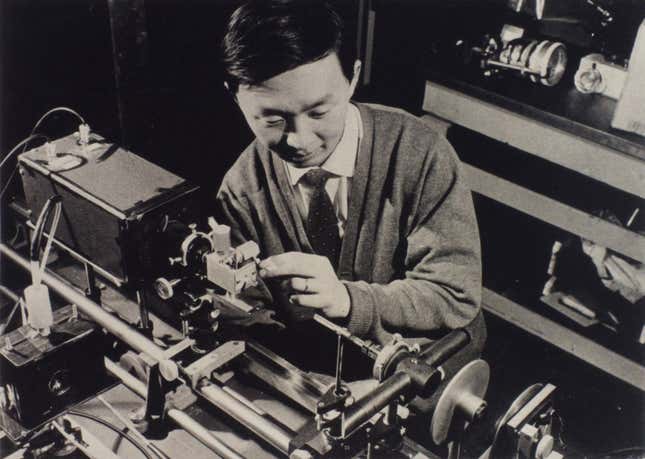
2009
Hong Kong physicist Charles Kao, dubbed the “father of fiber optics communication,” was jointly awarded the 2009 Nobel Prize in Physics.
In 1966, Kao developed a fiber optic wire that was able to carry as much information as is contained in 200,000 phone calls, giving rise to many of the communication products now taken for granted.
2010
In January, a group of opposition legislators known as the five pan-democrats collectively resigned to force a special election that would pit pro-democracy candidates against pro-Beijing ones in what they hoped would be a de facto referendum on democracy.
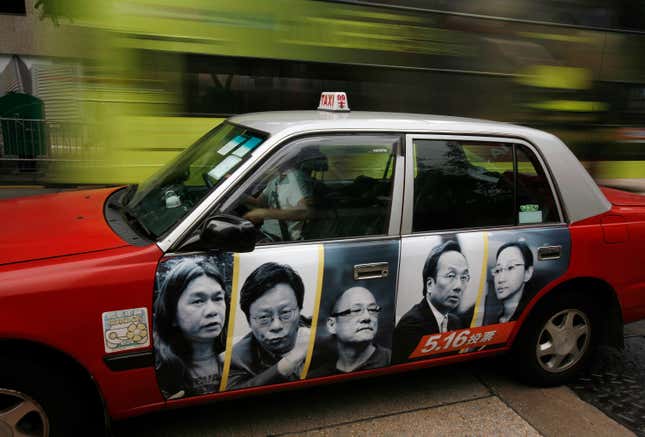
In May that year, the five pan-democrats, including Albert Chan, Leung Kwok-hung, and Wong Yuk-man, won back their seats amid a record low turnout of 17%. They toasted their victory saying 500,000 Hong Kong people had voted to show they cared about democracy. Pro-Beijing figures said the poll was a waste of taxpayer money.
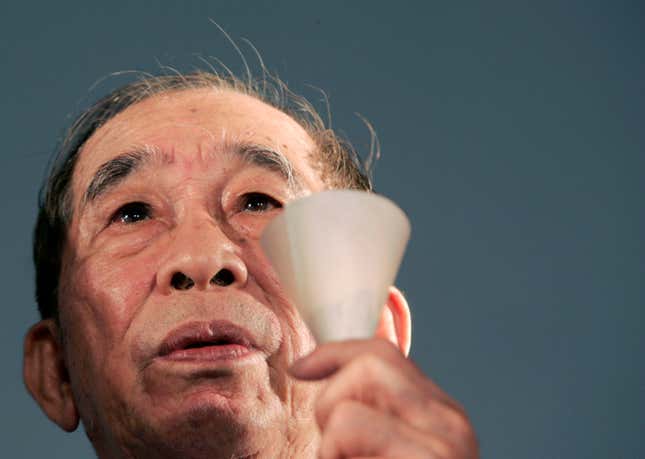
2011
Szeto Wah, a prominent democracy activist in Hong Kong, died from lung cancer at age 79. Szeto was a leftist who had organized protests against the British before the handover, but he cut off all ties to Beijing after the 1989 Tiananmen Square massacre. In the same year, he founded the Hong Kong Alliance in Support of Patriotic Democratic Movements in China, which holds an annual June 4 candlelight vigil to remember the deaths in the military crackdown to the present day.
2012
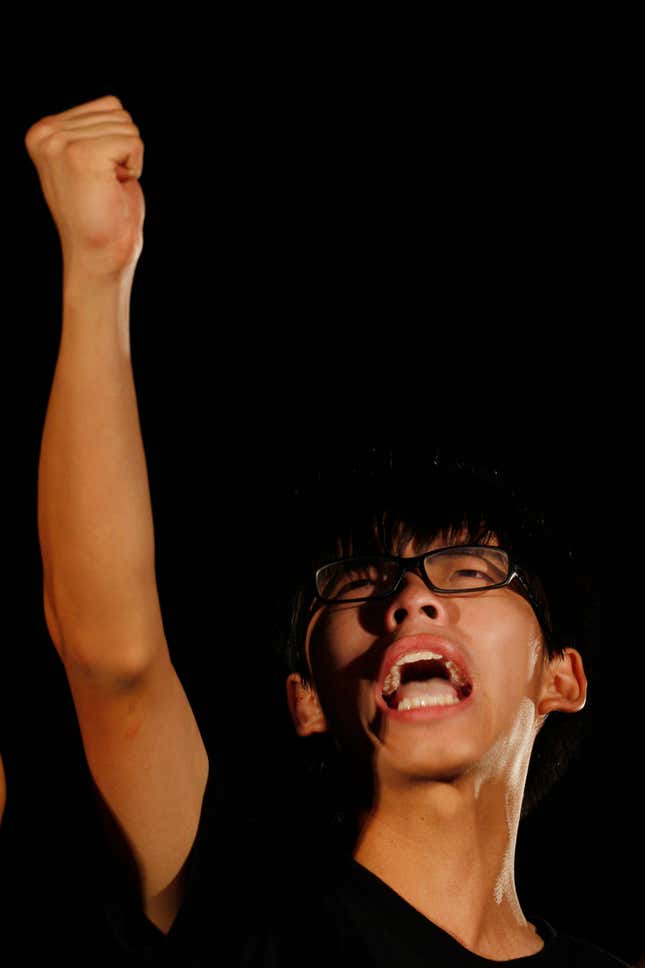
Joshua Wong, now one of Hong Kong’s best-known democracy activists, shot to prominence here when he was still in high school. In 2012, a 14-year-old Wong and his Scholarism activist group became the face of a series of protests against implementing “national education” in Hong Kong, which he and other critics denounced as Chinese patriotic “brainwashing.”
He went on to become one of the leaders of the 2014 pro-democracy Umbrella Movement. In 2016 he co-founded a new political party, Demosisto, which advocates a referendum to determine Hong Kong’s sovereignty.
In March that same year, Leung Chun-ying won 689 votes out of the 1,132 votes cast by the largely pro-Beijing election commitee, and started his five years as chief executive. During his term there was a drastic escalation in clashes over Hong Kong’s autonomy and he leaves this month as one of the territory’s most-loathed leaders.
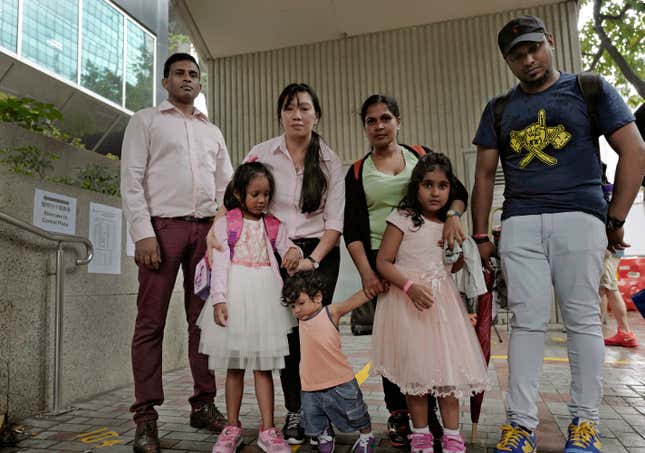
2013
In May 2013, Edward Snowden fled to Hong Kong to leak thousands of classified documents about the US’s spy program. Seven refugees sheltered him in their small, cramped flats for two weeks, before he headed to Moscow, Robert Tibbo, a lawyer for Snowden and the refugees, told reporters in 2016.
The refugees decided to speak out about hiding Snowden to pressure the Hong Kong government into giving them asylum after years of waiting, but their cases were rejected this May. “Now what they’re facing is a transparent injustice from the very people that they asked to protect them,” said Snowden, lashing out at the Hong Kong government’s decision.
2014
In September 2014, tens of thousands of Hong Kong citizens occupied the city’s central financial district and elsewhere demanding universal suffrage to elect the chief executive in 2017 without Beijing pre-screening a shortlist of candidates.
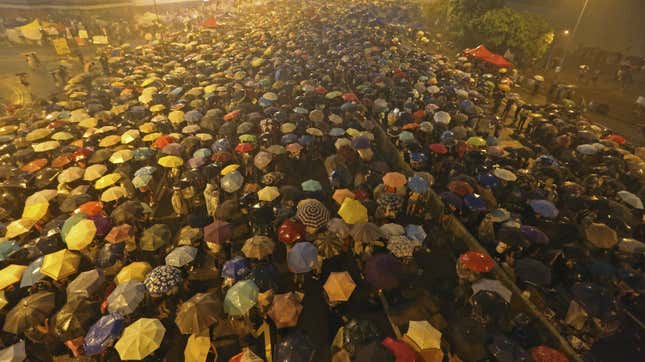
Hong Kong’s biggest protest in decades, the demonstration disrupted the city for 79 days. The umbrella has become a symbol of the movement, used to shield protesters from police tear gas, pepper spray, and batons.
The protest failed to make any perceptible progress toward universal suffrage, but inspired many young people in Hong Kong to devote themselves into politics.
2015
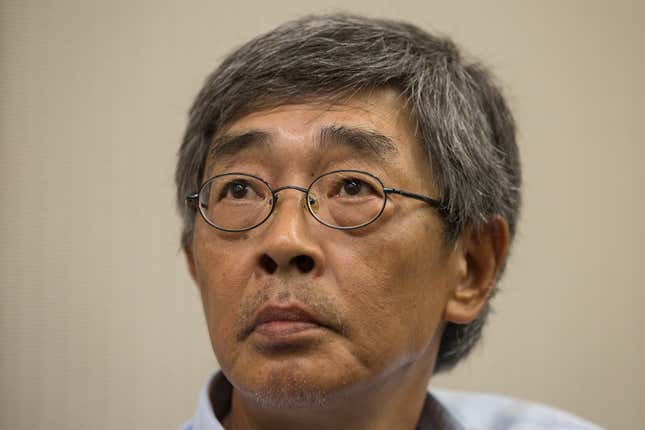
In late 2015, five Hong Kong booksellers mysteriously disappeared one after another, leading many to fear they were abducted by the Chinese government for publishing political titles critical of Beijing. Months later, two of them reappeared to say they traveled to China on their own volition.
Lam Wing Kee, owner of Causeway Bay Books, offered a completely different account. After returning to Hong Kong in June 2016, Lam gave a long press conference to detail his eight-month detention in China, saying he was kidnapped across the border, forced to make a fraudulent public confession, and denied any legal representation.
The bookseller disappearances have raised unprecedented concerns about Beijing’s meddling in Hong Kong’s judicial independence and freedom of publication.
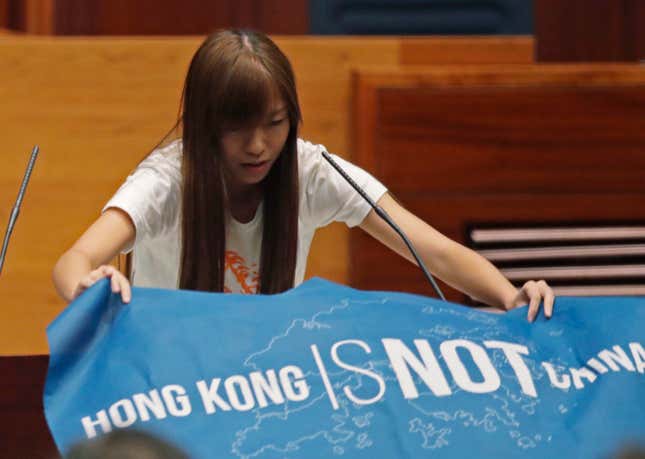
2016
Yau Wai-ching, 25, is the youngest woman to be elected Hong Kong’s legislator. In the swearing-in ceremony in October 2016, Yau used a derogatory term against the Chinese nation in her oath, and was barred from officially entering the legislature. A Hong Kong court later ruled to disqualify Yau and her party colleague Baggio Leung, who took a similar oath using the slur.
The oath-taking saga also prompted Beijing to issue an interpretation of the Basic Law, even before the Hong Kong court could rule, demanding Hong Kong lawmakers and officials swear the scripted oath “correctly, completely, and solemnly.”
2017
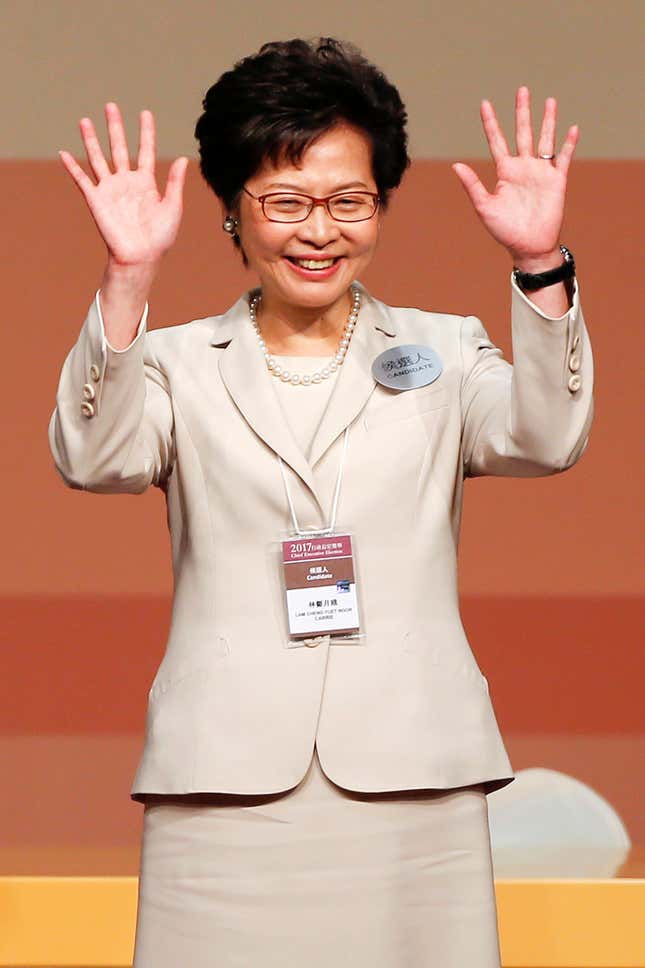
Carrie Lam will be sworn in as Hong Kong’s new leader on July 1, at a ceremony presided over by Xi Jinping. Widely seen as Beijing’s favored candidate, Lam won 777 votes out of the less than 1,200 valid votes cast in March’s election, becoming the first woman to hold the position.
Lam, 60, is a career civil servant. She previously served as Hong Kong’s No. 2 official under unpopular outgoing chief executive Leung Chun-ying and campaigned on promises to make housing more affordable and improve education. Upon winning, she said she would heal Hong Kong’s divisions and “unite our society to move forward.”
As Beijing warned against Hong Kong independence in the run-up of the July 1 celebration, Lam recently said that she wants to teach Hong Kong kids “I am Chinese” as early as kindergarten.
Read Quartz’s complete series on the 20th anniversary of the Hong Kong handover.
